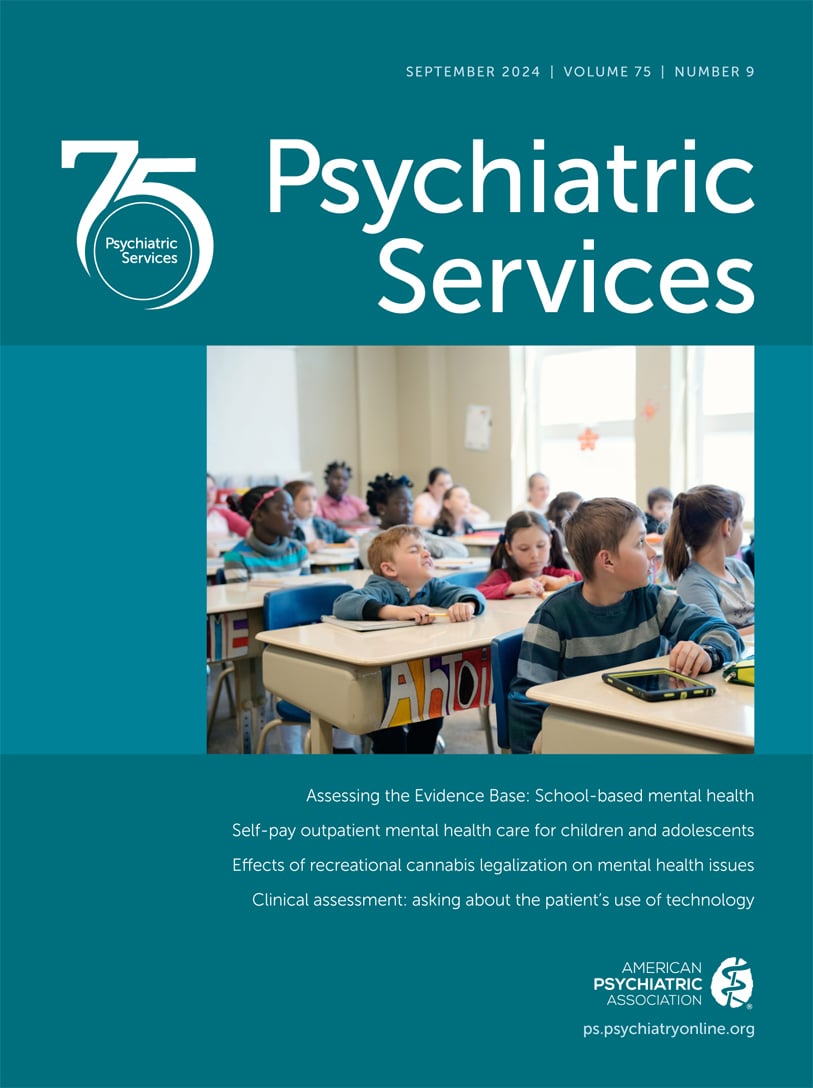Psychiatric Services
- Volume 71
- Number 7
- July 2020
Taking Issue
Articles
Publication date: 08 April 2020
Pages648–655Objective: Studies have shown that Housing First, a recovery-oriented housing intervention, is effective in reducing service utilization among homeless individuals with mental illness, but less is known about how Housing First affects patterns of service ...
https://doi.org/10.1176/appi.ps.201900260Publication date: 26 March 2020
Pages656–662Objective: Research has suggested that increased length of mandated community treatment for individuals with a serious mental disorder leads to better outcomes, but few studies have described whether these outcomes are maintained after treatment ends. The ...
https://doi.org/10.1176/appi.ps.201900456Publication date: 02 April 2020
Pages663–669Objective: The purpose of this secondary data analysis was to describe racial-ethnic disparities in receipt of depression treatment and treatment modality among adult Medicaid beneficiaries with depression from a nationally representative sample—28 states ...
https://doi.org/10.1176/appi.ps.201900407Publication date: 12 May 2020
Pages670–677Objective: The Veterans Metrics Initiative is a longitudinal survey study examining the military-to-civilian transition of a cohort of new post-9/11 veterans. This study identified the programs and services used by new post-9/11 veterans who screened ...
https://doi.org/10.1176/appi.ps.201900326Publication date: 10 March 2020
Pages678–683Objective: Depression and alcohol use disorder are among the most common causes of disability and death worldwide. Health care systems are seeking ways to leverage technology to screen, evaluate, and treat these conditions, because workforce interventions ...
https://doi.org/10.1176/appi.ps.201900457Publication date: 22 May 2020
Pages684–690Objective: Expanding access to addiction screening and treatment in primary care, particularly in underserved communities, is a key part of the fight against the opioid epidemic. This study explored correlates of addiction treatment capacity in federally ...
https://doi.org/10.1176/appi.ps.201900409Reviews & Overviews
Publication date: 02 April 2020
Pages691–697Many mental health and justice professionals have noted that the system that manages both competence to stand trial (CST) evaluation and competence restoration (CR) processes in criminal cases is in crisis. Public mental health services often are ...
https://doi.org/10.1176/appi.ps.201900483Publication date: 02 April 2020
Pages698–705The sequential intercept model (SIM) is used to reduce the penetration of persons with mental illness and substance use disorders in the criminal legal system. Its framework recommends identifying individuals with mental illness at various decision points ...
https://doi.org/10.1176/appi.ps.201900484Special Articles
Publication date: 19 March 2020
Pages706–712Psychoactive medications are the most expensive and fastest-growing class of pharmaceutical agents for children. The cost, side effects, and unprecedented growth rate at which these drugs are prescribed have raised alarms from health care clinicians, ...
https://doi.org/10.1176/appi.ps.201900417Publication date: 23 April 2020
Pages713–721The authors make the case for expanding the national discussion of inpatient psychiatric beds to recognize and incorporate other vital components of the continuum of care in order to improve outcomes for individuals with serious mental illness. They ...
https://doi.org/10.1176/appi.ps.201900516Brief Reports
Publication date: 24 February 2020
Pages722–725Objective: This study evaluated whether access to and engagement in substance use disorder treatment has improved from 2010 to 2016. Methods: Data submitted by commercial and Medicaid health plans, representing over 163 million beneficiaries from 2010 to ...
https://doi.org/10.1176/appi.ps.201800461Publication date: 10 March 2020
Pages726–729Objective: People with serious mental illness in the United States have higher human immunodeficiency virus (HIV) infection rates than the general U.S. population. This study aimed to assess delivery of HIV services in New York State’s outpatient mental ...
https://doi.org/10.1176/appi.ps.201900415Publication date: 23 April 2020
Pages730–733Objective: The purpose of this study was to evaluate a 16-week, reverse–integrated care (bringing primary care interventions/services into the psychiatric setting) behavioral and educational group intervention for individuals with serious mental illness ...
https://doi.org/10.1176/appi.ps.201900336Open Forum
Publication date: 19 March 2020
Pages735–737Contact-based interventions are commonly regarded as best practice in stigma reduction. In this Open Forum, the author used the findings from eight systematic reviews to critically evaluate the quality of the evidence for the effectiveness of such ...
https://doi.org/10.1176/appi.ps.201900587Commentary
Personal Accounts
Law & Psychiatry
Publication date: 22 May 2020
Pages741–744Civil commitment ranks among the most contentious and coercive elements of mental health care. Although civil commitment is practiced across the United States, basic statistics about these policies, such as the numbers of involuntary psychiatric ...
https://doi.org/10.1176/appi.ps.202000212Social Determinants of Mental Health
Publication date: 19 March 2020
Pages745–748Employment has the potential to contribute to positive health outcomes for people with serious mental illnesses; however, its flipside, long-term unemployment, is a social determinant that has not been consistently recognized for its negative effects. ...
https://doi.org/10.1176/appi.ps.201900522Technology in Mental Health
Publication date: 28 May 2020
Pages749–752In anticipation of a surge of COVID-19 cases in Northern California, the outpatient psychiatric clinic at UC Davis Health, in which 98% of visits initially occurred in person, was converted to a telepsychiatry clinic, with all visits changed to virtual ...
https://doi.org/10.1176/appi.ps.202000230Frontline Reports
Past Issues
View Issues Archive
Vol. 75 | No. 12

Vol. 75 | No. 11

Vol. 75 | No. 10
